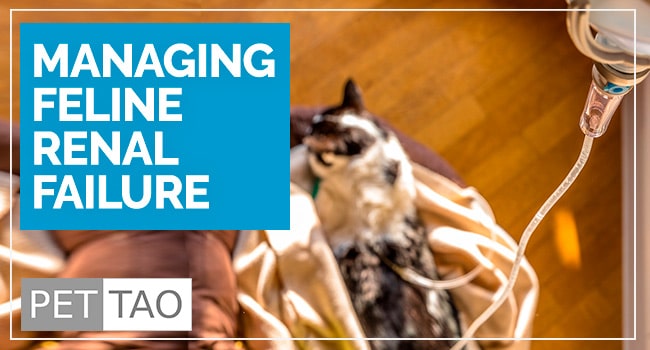Do you know the four goals of treatment for cats with renal failure?
- Decrease signs of uremia including gastritis and inappetence
- Regulate fluids, electrolytes, minerals, and acid-base status
- Provide optimal nutrition
- Retard progression of CKD
Hopefully, with early diagnosis and proper management, your kitty can live a productive life free of feline CRF symptoms.
To prolong your cat’s life and relieve the symptoms of renal failure, you must address the following:
- Dietary therapy
- Protein loss
- High blood pressure
- Phosphorous and calcium abnormalities
- Low potassium
- Anemia
- Fluid replacement with subcutaneous fluids
- Treatment of acidosis
Dietary Therapy
Feed cats with symptoms of chronic renal failure a diet designed specifically for cats with renal disease.
Dietary therapy is the only therapeutic intervention proven to favorably alter the course of cat kidney failure.
Two recent clinical studies confirm the value of renal diets in altering the course of chronic kidney disease.
Dietary therapy specifically addresses the four primary goals of treatment mentioned at the beginning of this article:
- Decrease signs of uremia including gastritis and inappetence
- Regulate fluids, electrolytes, minerals, and acid-base status
- Provide optimal nutrition
- Retard progression of CKD
Remember, dietary therapy is only one component of treatment.
Combining other components of conservative medical management with an appropriate diet gives your cat the best chance of minimizing cat kidney failure symptoms.
Frequently, antacids such as Pepcid are also employed to combat gastritis.
Consistent re-evaluation of patients at regular intervals is mandatory to accurately monitor therapeutic response.
All cats do not respond the same way.
In spite of your best efforts, many cats with chronic renal failure turn away from a renal diet.
If your kitty rejects a special diet, try appetite stimulants such as mirtazapine, valium, and cyproheptadine.
ACE Inhibitors for Protein Losses
Use ACE inhibitors (benazepril, enalapril) to minimize protein loss in the urine and decrease blood pressure.
Benazepril is probably the most common ACE inhibitor used in veterinary medicine.
Systemic Hypertension Treatments
Persistently elevated blood pressure, termed hypertension, causes cat renal failure.
Systemic hypertension occurs in roughly 20% of cats with renal disease.
Sustained hypertension damages other vital organ systems as well.
The cardiovascular, ocular, neurologic, and renal systems all slowly deteriorate due to high blood pressure.
Usually, a diagnosis requires 3-5 independent determinations of blood pressure performed by your veterinarian.
Amlodipine is the preferred drug for controlling blood pressure.
Unfortunately, renal function and repeated blood pressure monitoring are necessary after beginning antihypertensive therapy.
Hyperphosphatemia (Increased Phosphorous) Treatment
For most cats, phosphorous counts will remain normal with dietary therapy alone.
However, if dietary therapy fails to reduce serum phosphorus below 6.0 mg/dl, then intestinal phosphate binders may be necessary.
TUMS is one of the most common home remedies for increased phosphorous.
Subcutaneous Fluid Therapy for Replacement
Subcutaneous fluid therapy is the most important component of treatment.
And I’ll say it again!
Subcutaneous fluid therapy is the most important component of treatment.
Not every cat needs subcutaneous fluids, but most do.
Cats responding clinically to fluids (improved appetite, activity, or interactions) are clear candidates for chronic therapy.
My recommendation is 150-200cc three to four times per week.
Monitor body weight and eating habits to assess the need to change the fluid amount given or frequency.
Most of you will cringe at the thought of giving your precious kitty fluids.
However, the technique is surprisingly easy and your kitty will appreciate it.
I promise.
Therapy for Hypokalemia (Low Potassium)
Potassium supplementation may be necessary to prevent or correct hypokalemia in some cats.
20% of cats with renal disease are low in potassium.
Supplement renal diets with potassium.
Determine the need for potassium supplementation only after starting dietary therapy.
Oral administration is the preferred route of administration for potassium replacement therapy.
Potassium gluconate is generally the preferred supplement.
Avoid acidifying diets restricted to magnesium. Low magnesium diets promote hypokalemia.
Therapy for Acidosis
Confirm metabolic acidosis through laboratory testing.
If diet alone fails to control acidosis, try other treatments such as sodium bicarbonate.
Treatment of Anemia
Any chronic disease causes anemia (low red blood cell count.)
Consequently, anemia in cats with chronic renal failure is common.
In fact, profound anemia marks end-stage renal failure.
Most cats are quite lethargic and occasionally non-responsive.
Erythropoietin deficiency is the principal cause of anemia in renal disease cats.
In essence, the kidney fails to produce enough erythropoietin to maintain adequate red blood cells.
The treatment is, you guessed it, erythropoietin generally administered as an injection every 5-7 days.
The treatment is fairly expensive yet works quite well.
Correction of low red blood cell count to normal takes approximately 2 to 8 weeks depending on the starting count and dose given.
Frequently, stanazolol is also used to treat anemia in cats.
Stanozolol is an anabolic steroid that increases appetite and enhances the quality of life.
Increases in appetite, body weight, energy level, and sociability are all reported by satisfied owners with the use of stanazolol and erythropoietin.
You can successfully manage your cat’s renal disease for many years if caught early and managed appropriately.
Powerful Tools for Cat Kidney Failure Challenges
There are several quick and easy changes you can make at home to help you give your cat an edge on easing kidney disease and renal failure challenges.
- Learn more about cat renal failure.
- Ask your vet about Epakitin. Epakitin is a chitosan-based supplement that helps with the filtering your cat’s kidneys can no longer do.
- Home cook for your pet. Go to our slow-cooker recipe page and try one of our cat food recipes for kidney disease or renal failure. Make sure to run it by your holistic vet first!
- Learn more about TCVM Herbal Remedies. Chinese medicine offers many amazing natural solutions for dog allergies Some good examples are:








